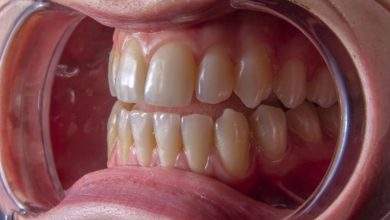
Lately, teeth whitening has become a highly sought-after cosmetic dentistry procedure. But with influencers promoting at-home kits, DIY “hacks,” and miracle pastes, it’s no surprise that myths spread faster than facts.
Many people want brighter teeth but feel confused about what actually works, what’s safe, and what might secretly damage their enamel. This is where dental professionals become invaluable.
Professionals bring a wealth of experience, having witnessed the outcomes of both effective teeth whitening treatments and questionable home experiments. Their expert insights play a crucial role in distinguishing between truth and viral fiction surrounding teeth whitening.
This article will explore the most prevalent misconceptions surrounding teeth whitening. Whether you’re considering professional whitening, curious about natural remedies, or just trying to avoid damaging your teeth, this article clears up the confusion.
Myth #1: Whitening Harms Tooth Enamel
A common concern among individuals is the fear that teeth whitening could damage or weaken their enamel. The truth is that professional whitening does not damage healthy enamel. This process works by penetrating the enamel’s surface and breaking down discoloration molecules, rather than thinning the enamel itself.
Confusion often arises from improper use of whitening products. Overusing at-home kits, employing overly strong gels without proper guidance, or resorting to abrasive techniques can irritate the teeth and gums.
Such sensitivity can make people assume that enamel damage has occurred. When used properly, whitening products like hydrogen peroxide and carbamide peroxide that have been recommended by dentists are actually harmless.
The true risk lies in DIY methods or unregulated products. Ingredients like lemon juice, vinegar, and strong abrasives, as well as dubious “super gels” found online, can erode enamel and cause irreversible damage.
This risk is highlighted in an article by DUBAWA. The article counters a viral claim that combining banana peel, lemon, salt, and toothpaste can safely whiten teeth and produce quick results. This claim, popular on social media, is deemed misleading by scientific evidence and dental professionals.
Research shows that banana peel does not effectively whiten teeth and may even lead to slight yellowing. Additionally, the high acidity of lemon juice can erode tooth enamel. This leads to lasting sensitivity and damage, while salt’s abrasive nature can remove stains but may also harm enamel if overused.
Myth #2: Whitening Toothpaste Can Fully Whiten Teeth
Many people believe that whitening toothpaste can significantly enhance the brightness of their smile, but this is a common misconception. While whitening toothpaste can be beneficial, its effectiveness is limited. The major component of these formulas is a mild abrasive that cleanses surface stains from tobacco, coffee, and tea.
Research has shown that toothpastes containing ingredients like sodium hexametaphosphate (SHMP), hydrogen peroxide, or sodium bicarbonate are more effective at removing stains. They perform better than regular toothpastes.
The study published in ScienceDirect tested three whitening and two conventional toothpastes for their ability to remove coffee stains. It was found that those with SHMP, hydrogen peroxide, or sodium bicarbonate significantly outperformed the non-whitening options.
However, even the best whitening toothpaste cannot change the intrinsic color of the teeth. True whitening requires bleaching agents, such as hydrogen peroxide, that can penetrate the enamel to break down deeper discoloration. Since most whitening toothpastes contain little to no peroxide, they are not strong enough to produce dramatic or long-lasting whitening.
This is why professional whitening or dentist-approved treatments remain the gold standard. As Absolute Smile highlights, teeth whitening results may fade over time. This is especially true if you frequently consume foods and drinks like coffee, wine, or berries that can stain your teeth. Periodic touch-ups are typically necessary to maintain a bright smile.
Myth #3: Charcoal Whitening Works Better Than Professional Treatments
While activated charcoal may seem trendy and visually striking, dentists caution that the reality doesn’t support these claims. Charcoal does not bleach teeth, eliminate deep stains, or outperform professional treatments. Its effects are primarily superficial, and even those results can be inconsistent.
A study published in Frontiers examining over-the-counter (OTC) whitening products reinforces this point. The review found little scientific evidence supporting the superiority of “natural” or charcoal-based options.
Instead of chemically altering intrinsic tooth color, these products mainly target external stains. For this reason, most OTC whitening products, including charcoal, cannot be considered replacements for professional bleaching treatments.
Also, the main concern with charcoal is its abrasiveness. The rough particles can scrub away surface stains, but also risk scratching the enamel. These tiny scratches may not be immediately visible. However, over time, the scratches may erode the enamel, leaving teeth more prone to discoloration and sensitivity.
As enamel gradually wears away, the yellow dentin beneath becomes more noticeable, which can make teeth appear less attractive. Ironically, because charcoal products lack real whitening effectiveness, many users tend to apply them more frequently in hopes of achieving better results. However, this overuse only heightens the risk of irreversible enamel damage.
Myth #4: Whitening Treatments Work on All Dental Restorations
Many people assume that whitening treatments can brighten all types of dental work, but this is far from true. Dental restorations, such as crowns, veneers, and fillings, are typically made from materials like porcelain or composite resin.
Such materials are intentionally designed to resist staining and maintain their shade over time. Because of this, bleaching agents simply cannot penetrate restorations the way they do natural tooth enamel.
As a result, while your natural teeth may lighten with whitening treatments, your restorations will stay exactly the same. This often leads to a noticeable mismatch, especially when the restoration is in a visible area at the front of your smile.
It’s also important to note that the bright smiles seen online may not be solely the result of whitening. As per Tufts Now, they could be due to Photoshop or smile-brightening filters. As a dental expert notes, if you have crowns already, they will not bleach. You might achieve super-white teeth, but your crowns will appear darker.
To avoid this mismatch, dentists often advise whitening your natural teeth before getting cosmetic restorations. This approach allows the dentist to match the crown or veneer to your newly brightened smile.
FAQs
Are teeth whitening results permanent?
Teeth whitening outcomes are not permanent. Depending on your lifestyle choices, they may last anywhere from a few months to a few years. To extend the brightness of your smile, it’s advisable to steer clear of stain-causing foods and beverages and to practice good oral hygiene.
Is the sensitivity from teeth whitening permanent?
Sensitivity from teeth whitening is usually temporary and fades within a few days after treatment. As the enamel rehydrates and minerals replenish, discomfort decreases. If sensitivity lasts longer than a week or becomes intense, it may signal an underlying dental issue that requires professional evaluation.
Can we use olive oil to whiten our teeth?
Pulling olive oil does not make teeth whiter. There is no scientific proof that it can effectively eliminate stains or lighten tooth color. However, it may assist in reducing bacteria in the oral cavity. Nevertheless, this method cannot substitute the outcomes of professional teeth-whitening procedures.
It’s easy to be swayed by the newest fads and misconceptions about teeth whitening. However, knowing what genuinely works and what doesn’t is essential for safely achieving a bright smile.
By turning to professional advice and debunking common misconceptions, you can avoid damaging your teeth with misguided DIY attempts. Ultimately, the path to a radiant smile lies in informed choices, prioritizing both aesthetics and dental health.




